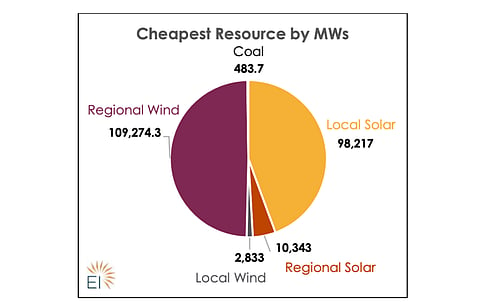

US based climate think tank Energy Innovation Policy & Technology LLC (EI) believes the US can save 'significant' amounts of money by switching to renewables instead of continuing to run its coal fleet. This will be enough to finance nearly 150 GW of 4-hour battery storage, over 60% of the coal fleet's capacity, and generate $589 billion in new investment across the country.
In its new report titled Coal Cost Crossover 3.0: Local Renewables Plus Storage Create New Opportunities for Customer Savings and Community Reinvestment, the analysts stress that for more than 75% of coal capacity, renewable generation can help the US save a minimum 30% of the cost for each unit of energy produced.
According to the findings of the study, 99% of all coal-fired power plants in the US are more expensive to operate on a forward-looking basis than the all-in cost of replacement renewable energy projects. At the same time, 97% are more expensive than renewable energy projects sited within 45 kilometers.
"For more than three quarters of US coal capacity, the all-in cost per MWh of the cheapest renewable option is at least a third cheaper than the going-forward costs for the coal it would replace," reads the report.
The Inflation Reduction Act (IRA) also creates 'thoughtful new investment opportunities' by providing 10% tax credit to locate the project in an energy community which the report writers define say includes census tracts in which coal-fired power plants have been retired since 2009 and adjacent census tracts.
EI studied 210 coal power plants with 220 GW combined capacity in the US in 2021 and found 205 of these having local renewable options that would be cheaper than coal-fired electricity, leading to creating as much as $589 billion in local capital investment that could support economic diversification, job creation and tax revenues.
Building local solar and wind power plants near a retiring coal plant can help save costs otherwise incurred on developing interconnection infrastructure which then can be used to fund resources that can provide additional energy and reliability to the grid.
The analysts state, "We find that the savings generated by shifting to local solar could fund the addition of 137 GW of 4-hour batteries across all plants, and 80% or more of the capacity at a third of existing coal plants – the economics of replacing coal with renewables are so favorable that they could fund a massive battery storage buildout to add reliability value along with emissions reductions."
This recommended transition, boosted by the IRA incentives, can be made even more cost-effective if utilities can harness the IRA's loan and grant programs and use best practices to assess cost-saving replacement options, the report writers add.
The complete report is available for free download on Energy Innovation's website.
